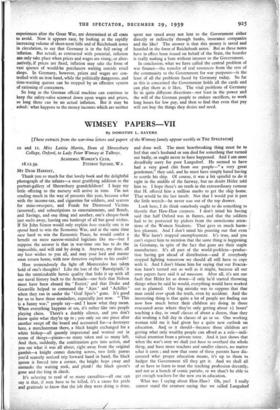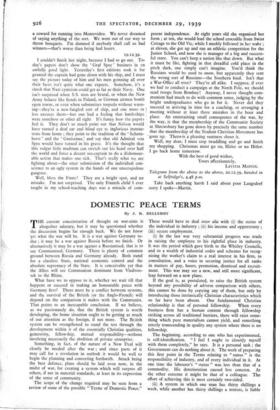WIMSEY PAPERS VII
By DOROTHY L. SAYERS
[These extracts from the war-time letters and papers of the Wimsey family appear weekly in THE SPECTATOR] to and Ir. Miss Letitia Martin, Dean of Shrewsbury College, Oxford, to Lady Peter Wimsey at Talboys.
ACADEMIC WOMEN'S CLUB, 18.12.39. FITZROY SQUARE, W.I.
MY DEAR HARRIET, Thank you so much for that lovely book and the delightful photograph of the infants—a most gratifying addition to the portrait-gallery of Shrewsbury grandchildren! I hope my Little offering to the nursery will arrive in time. I'm not sending much in the way of presents this year, because what with the income-tax, and cigarettes for soldiers, and scarves for mine-sweepers, and Funds for Distressed Victims (assorted), and subscriptions to entertainments, and Bonds, and Savings, and one thing and another, one's cheque-book just melts away, leaving one bankrupt of all but good wishes. If Sir John Simon would only explain how exactly one is to spend hard to win the Economic War, and at the same time save hard to win the Economic Peace, he would confer a benefit on mere narrow-minded logicians like me—but I suppose the answer is that in war-time one has to do the impossible, and will end by doing it. Anyway, my dear, all my best wishes to you all, and may your lord and master soon return home, with new detective exploits to his credit!
How tremendously the fight off Montevideo has taken hold of one's thoughts! Like the loss of the Rawalpindi,' it has the unmistakable heroic quality that links it up with all our naval history back to the Armada--one feels that Nelson must have been aboard the ` Exeter,' and that Drake and Grenville helped to command the ` Ajax ' and ` Achilles ' when they ran in under the ' Graf Spee's ' guns. It's good for us to have these reminders, especially just now. " This is a funny war," people say—and I know what they mean. When everything happens at sea, it's rather like two people playing chess. There's a deathly silence, and you don't know quite what they're up to ; you only see one piece after another swept off the board and accounted for—a destroyer here, a merchantman there, a black knight exchanged for a white bishop—all queerly impersonal and worked out in terms of things—pieces—so many taken and so many left. And then, suddenly, the combination gets into action, and you see what it was all about, right away from the original gambit—a knight comes dancing across, two little pawns you'd scarcely noticed trip forward hand in hand, fhe black queen is forced into a corner, the knight hops away and unmasks the waiting rook, and plonk! the black queen's gone and the king in check. It's sobering to read of so many casualties—all one can say is that, if men have to be killed, it's a cause for pride and gratitude to know that the job they were doing is done, and done well. The most heartbreaking thing must be to feel that one's husband or son died for something that turned out badly, or ought never to have happened. And I am most dreadfully sorry for poor Langsdorf. He seemed to have had a very good chit from our people—" a very great gentleman," they said, and he must have simply hated having to scuttle his ship. Of course, it was a bit spiteful to do it right in the middle of the fairway, but no doubt Hitler told him to. I hope there's no truth in the extraordinary rumour that H. offered him a million marks to get the ship home. That would be the last insult. Not that I would put it past the little wretch—he never was out of the top drawer.
Look here, I do think somebody ought to do something to throttle that Haw-Haw creature. I don't mind his having said that half Oxford was in flames, and that the soldiers had to be protected by pickets from the unwelcome atten- tions of the Women Students. That gave us much harm- less pleasure. And I don't mind his pointing out that even ' the War hasn't stopped unemployment. It's true, and you can't expect him to mention that the same thing is happening in Germany, in spite of the fact that guns are their staple manufacture. It's all part of the world-problem—produc- tion having got ahead of distribution—and if everybody stopped fighting tomorrow we should all still have to cope with it. And I don't blame him for saying that our Evacua- tion hasn't turned out as well as it might, because all our own papers have said it ad nauseam. After all, it's not our fault that Hitler let us down—if only he'd started throwing things when he said he would, everything would have worked out as planned. Our big mistake was to suppose that that man could ever speak the truth, even by accident. And the interesting thing is that quite a lot of people are finding out now how much better their children are doing in those evacuated areas where they're only getting about ri hours' teaching a day, in small classes of about a dozen, than they did working a full day in classes of 4o or so. One working woman told me it had given her a quite new outlook on education. And so it should—because those children are getting what only wealthy people can afford as a rule—indi- vidual attention from a private tutor. And it just shows that when the war's over we shall just have to overhaul the whole thing, and have more teachers and smaller classes, no matter what it costs ; and now that some of these parents have dis- covered what proper education means, it's up to them to badger the Government till they get it. And we shall all of us have to learn to treat the teaching profession decently, and not as a bunch of comic pariahs, or we shan't be able to get enough teachers for the new era in education.
What was I saying about Haw-Haw? Oh, yes! I really cannot stand the creature saying tha: we called Langsdorf a coward for running into Montevideo. We never dreamed of saying anything of the sort. We went out of our way to throw bouquets. I'm damned if anybody shall call us bad winners—that's worse than being bad losers.
19.12.39.
I couldn't finish last night, because I had to go out. To- day's papers don't show the ' Graf Spee ' business in an awfully good light. Yesterday's first editions took it for granted the captain had gone down with his ship, and I must say the picture today of him and his men grinning all over their faces isn't quite what one expects. Somehow, it's a shock that Nazi cynicism could get as far as their Navy. One isn't surprised when S.S. men are brutal, or when the New Army behave like fiends in Poland, or German airmen bomb open towns, or even when submarines torpedo without warn- ing—they're a new-fangled sort of ship, and one more or less excuses them—but one had a feeling that battleships were somehow or other all right. It's funny how the papers feel it. They don't so much point out that Nelson would have turned a deaf ear and blind eye to inglorious instruc- tions from home ; they point to the tradition of the Scham- horst ' and the Gneisenau,' and say that old Admiral von Spec would have turned in his grave. It's the thought that this vulgar little madman can stretch out his hand over half the world and force a decent sea-captain to do a dishonour- able action that makes one sick. That's really what we are fighting about—the utter submission of the individual con- science to an ugly system in the hands of one unscrupulous gangster.
Well, bless the Finns ! They are a bright spot, and no mistake. I'm not surprised. The only Finnish child I ever taught in my school-teaching days was a miracle of com- petent independence. At eight years old she organised her form ; at ten, she would lead the school crocodile from Swiss Cottage to the Old Vic, while I meekly followed in her wake ; at eleven, she got up and ran an athletic competition for the Junior School, and now she is manager of a big and success- ful store. You can't keep a nation like that down. But what it must be like, fighting in that dreadful cold place in the pitch dark, one simply can't imagine. You'd think the Russians would be used to snow, but apparently they sent the wrong sort of Russians—the Southern kind. Isn't that a War-Office all over? They're all alike. I suppose, if ever we had to conduct a campaign at the North Pole, we should send troops from Bombay ! Anyway, I never thought com- munism had much to do with common sense, judging by the bright undergraduates who go in for it. Never did they succeed in arriving in time for a coaching, or arranging a meeting without at least three mistakes in the hour and place. An entertaining small consequence of the war, by the way, is that the membership of the Communist Society at Shrewsbury has gone down by precisely the same number that the membership of the Student Christian Movement has 'gone up. There•is a pleasing neatness about it.
Well, my dear, I must stop twaddling and go and finish my shopping. Christmas must go on, Hitler or no Hitler. I go back home tomorrow.
With the best of good wishes, Yours affectionately, LETITIA MARTIN.
Telegram from the above to the above, 20.12.39, handed in at Selfridge's, 4.48 p.m.
Take back anything harsh I said about poor Langsdorf sorry I spoke—Martin.































 Previous page
Previous page